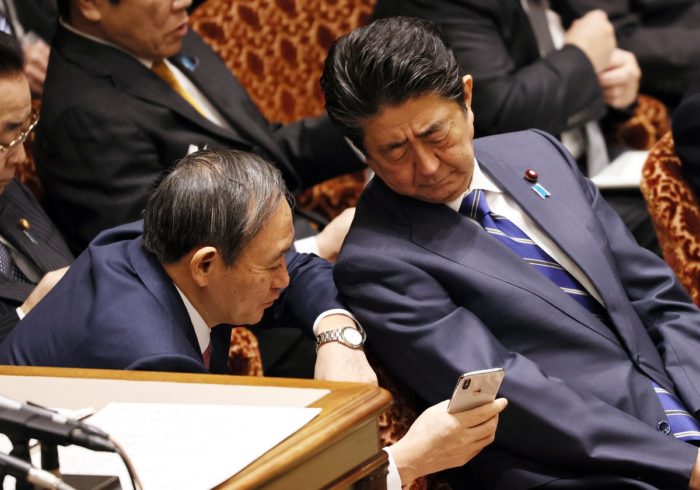Japan handles political transitions with enviable speed and lack of drama.
On August 28th, then Prime Minister Shinzo Abe shocked the country by announcing his resignation on health grounds. Less than three weeks later, former Chief Cabinet Secretary Yoshihide Suga was appointed prime minister, having comfortably bested two other candidates in an internal party election.
According to Sophia University Professor Koji Nakano, what we are getting is the Abe government without Abe. Certainly, Suga’s cabinet closely resembles the one that preceded it, with the key figure of Finance Minister Taro Aso, who held the office all through the Abe years, retaining his position.
The unassuming Suga is in some ways an unusual choice as leader. He was a cabinet minister for just one year, back in 2007, and has no faction of his own to support him. However, his experience as Chief Cabinet Secretary from 2012 to 2020 – effectively, being Abe’s right-hand man and point of liaison with the bureaucracy – made him the ideal continuity candidate. And continuity is what Japan needs as it recovers from the economic damage of the corona crisis.
Abe resigned because of a recurrence of the illness that ended his first spell in office, which lasted a mere twelve months in 2007. He returned in late 2012, with much improved health and much improved policies. If his medical issues were to clear up, as they did before, could he return for a third term?
There are at least six reasons why that could happen.
First, Abe may be the longest-serving prime minister in Japanese history, but he is six years younger than Suga and fifteen years younger than Taro Aso, as well as being nine years younger than US President Donald Trump and twelve years younger than Democratic Party presidential nominee Joe Biden. Time is still on his side.
The second reason is the unprecedented surge in popularity for the outgoing Abe cabinet. In the summer, support for Abe sagged as the coronavirus crisis dragged on. Strangely to European or American eyes, the public seemed highly critical of the government’s anti-virus strategy, even though the total fatality count of 1,470 barely exceeds the number of deaths caused by people choking on mochi (sticky rice cake) each year.
However, when faced with the reality of a premature end to the Abe era, public opinion executed a rapid U-turn. In early September, the outgoing Abe cabinet saw an unprecedented leap in support – from 35% to 62%, according to a JNN poll – in a single month. In line with that positive take on Abe’s overall achievements, the public switched to a strong preference for “Mr. Continuity” Suga over rival candidate Shigeru Ishiba, who had positioned himself as the “anti-Abenomics” candidate.
Third, Suga has little grounding in foreign / security policy, and there is nobody else in the cabinet that could reproduce Abe’s hyper-active personal diplomacy. Leaving such crucial matters in the hands of the foreign ministry would almost certainly achieve nothing. In the event that Donald Trump wins re-election in November, Japan would miss Abe’s “Trump-whispering” skills which helped Japan to avert the harsh treatment meted out to South Korea.
Fourth, Abe, though not a natural extrovert, stamped his presence on the world’s consciousness, thereby helping to raise Japan’s profile. It is hard to imagine Suga speaking at Davos, ringing the bell to open trading at the New York Stock Exchange or appearing as Super-Mario at an Olympic Ceremony.
Fifth, a general election must be held by next autumn, and Japan’s perpetually fissiparous opposition parties look as if they might for once get their act together. If they cease to obsess about microscopic scandals and come up with an attractive policy offering– such as a cut in the consumption tax – they might make inroads into the ruling Liberal Democratic Party’s hefty majority.
Suga already dropped one huge clanger when he talked of the need to raise the consumption tax, at a time when the damage done by the previous hike is still fresh. He swiftly rowed back on that lousy idea, but the episode was a reminder that Suga is, by experience and personality, more of a backroom operator than a savvy frontman. If he performs poorly in the forthcoming election, his days will be numbered.
Finally, Abe has unfinished business, notably in relation to the long-overdue reform of Japan’s U.S.-imposed constitution, enacted in 1947 and never subsequently amended.
Polls show that the public is strongly in favour of the issue being debated, which it would have to be before passing both houses of parliament and then being approved by a referendum. Such a public debate would be a novel and very constructive exercise in democratic decision-making. Who, other than Abe, could lead it?
A third term as prime minister would be unprecedented in the post-war period, but Abe is used to breaking records. Not for nothing is Tobias Harris’ well-researched and fair-minded new biography of him entitled “The Iconoclast.” And if we go back to the volatile early years of Japan’s parliamentary system in the Meiji era, we find that prime ministerial comebacks were common and both Hirobumi Ito and Taro Katsu served three times.
In Japan’s post-war system, it is not necessary to be prime minister to have significant political influence. A re-energized Abe could take another cabinet position, as Taro Aso has done, become a special envoy or simply exercise power from behind the scenes, as several “shadow shoguns” have in the past.
Abe has exited with the highest public approval of his entire term in office and has been succeeded by his most loyal lieutenant. Politically he is still very much intact. If circumstances allow, there is no reason why he should not take up the reins again.


